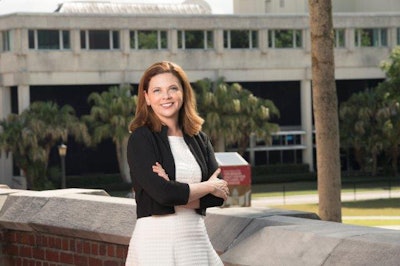NEW ORLEANS — Tania Tetlow had a successful stint as a lawyer and federal prosecutor before she embarked on a teaching career as a law professor at Tulane University.
After moving up the ranks to become the university’s chief of staff, Tetlow is making history with her recent appointment as the first woman and first lay person appointed president of Loyola University New Orleans, the private Jesuit University founded in 1904.
“I’ve been joking that I think the Jesuits in my family may have been secretly plotting to train me for this job without actually telling me about it,” says Tetlow, who hails from a family with deep ties in the Catholic church. Her father was a former Jesuit priest and psychology professor at Loyola and her mother also taught at Loyola before she earned her law degree at the university. Tetlow’s grandfather also attended the university and her uncle, Joseph Tetlow, was the dean of the College of Arts and Sciences for many years.
Now, at 46, Tetlow has been handed the mantle of a university that is more diverse than others. About 30 percent of its students are first-generation and 39 percent are students of color.
“What I love about universities and what makes me so excited about being here doing this, is that they are a driver of opportunity at their best,” says Tetlow, who officially takes the helm in September. “They are places that bring people together at their crucial moment in their development from across all kinds of difference and gives them a chance to learn and grow and understand each other better.”
 Tania Tetlow
Tania TetlowTetlow’s background in diversity and inclusion is impressive. Outside of teaching and writing about race and the U.S. Constitution, she co-chaired Tulane’s Presidential Commission on Race and Tulane Values that focused on changing campus culture and examining everything from student life and admissions to faculty hiring and retention at the largest private employer in New Orleans. She also spearheaded a campus climate survey on sexual violence.
“These issues of race and gender and ethnicity have been primary to what I’ve cared about and worked on,” says Tetlow, who understands the symbolism attached to her being the first woman and first non-Jesuit to lead the institution.
In fact, this historic moment in the life of the university is pregnant with possibilities for students, faculty and staff to examine the role of a Jesuit institution in contemporary times.
“It is fundamental to who you are and how you live your life. And there’s no part of that— and St. Ignatius made that clear— that’s limited to clergy,” says Tetlow. “The point of a Jesuit education has always been about your character and the person you become.”
As Tetlow hits the road as the chief recruiter for the university, she is selling Loyola’s values and her hometown city of New Orleans.
“The intersection between Jesuit mission and New Orleans,” is how Tetlow puts it. “The city and the Jesuit mission is about who you are as a person and wanting you to be the best possible version of yourself. I think that’s utterly fundamental about this city. It embraces who you are, you just got to bring your ‘A game’ to it. The Jesuit mission is about honing absolutely every skill you have to matter to the world.”
The Harvard- trained lawyer – who ran a law clinic on domestic violence and who chaired the New Orleans Public Library Board and raised more than $7 million to help rebuild the city’s flooded libraries post-Hurricane Katrina – is the right person to steer Loyola into the future, says Dennis Cuneo, a university trustee who chaired the Presidential Search Committee.
“With her deep roots in New Orleans and Jesuit values, she was born for this job,” says Cuneo.
For her part, Tetlow says she will work to foster an environment where individuals will be drawn to affinity groups that are not just based on demographics and will encourage a spirit of civic engagement.
“The ethos of the place is that people are drawn here from different regions, economic backgrounds, race/ethnicities and that they’re drawn to a place that has this very clear set of values which are all about social justice,” says Tetlow. “That glue makes these students far more willing to be open to each other and to assume that they probably have more in common than they realize, and to talk to each other with open hearts.”
And when challenges arise, she says that the key to good leadership is to be open and transparent with the students she serves.
“You have to make clear enough your values, such that you earn students’ trust on the front end and they will hopefully be patient with you when those circumstances come around that are excruciatingly difficult to navigate,” she adds.
This article appeared in the July 12, 2018 issue of Diverse.
Jamal Watson can be reached at [email protected]. You can follow him on Twitter @jamalericwatson



















